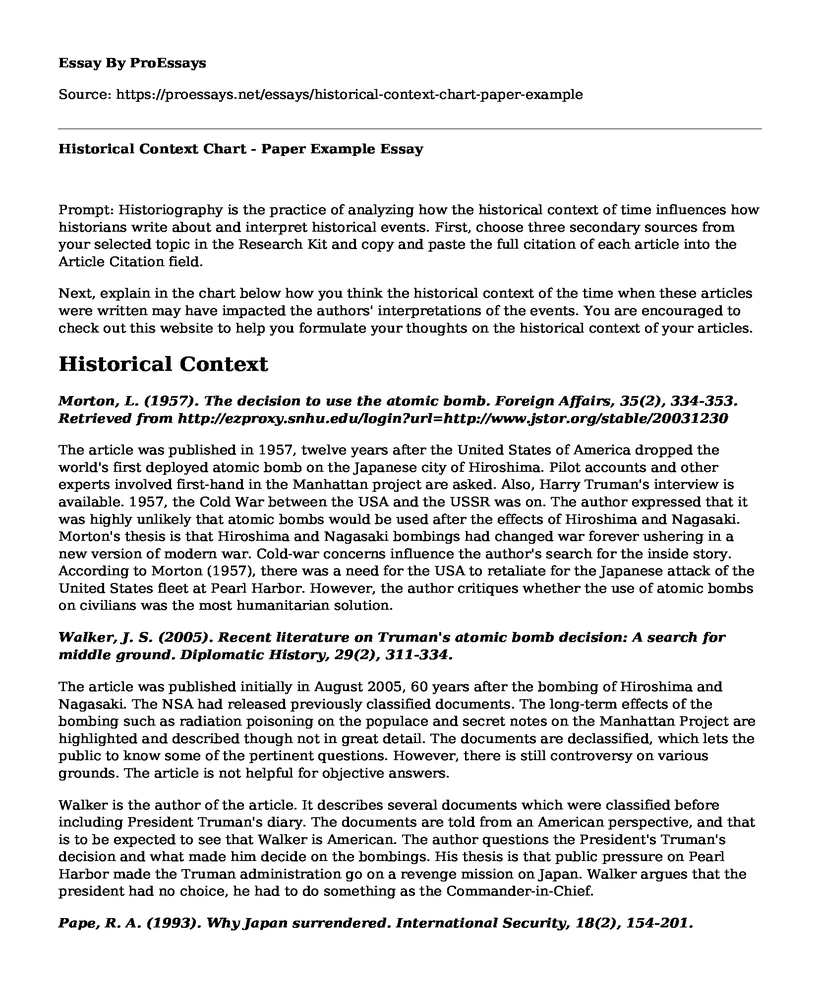Prompt: Historiography is the practice of analyzing how the historical context of time influences how historians write about and interpret historical events. First, choose three secondary sources from your selected topic in the Research Kit and copy and paste the full citation of each article into the Article Citation field.
Next, explain in the chart below how you think the historical context of the time when these articles were written may have impacted the authors' interpretations of the events. You are encouraged to check out this website to help you formulate your thoughts on the historical context of your articles.
Historical Context
Morton, L. (1957). The decision to use the atomic bomb. Foreign Affairs, 35(2), 334-353. Retrieved from http://ezproxy.snhu.edu/login?url=http://www.jstor.org/stable/20031230
The article was published in 1957, twelve years after the United States of America dropped the world's first deployed atomic bomb on the Japanese city of Hiroshima. Pilot accounts and other experts involved first-hand in the Manhattan project are asked. Also, Harry Truman's interview is available. 1957, the Cold War between the USA and the USSR was on. The author expressed that it was highly unlikely that atomic bombs would be used after the effects of Hiroshima and Nagasaki. Morton's thesis is that Hiroshima and Nagasaki bombings had changed war forever ushering in a new version of modern war. Cold-war concerns influence the author's search for the inside story. According to Morton (1957), there was a need for the USA to retaliate for the Japanese attack of the United States fleet at Pearl Harbor. However, the author critiques whether the use of atomic bombs on civilians was the most humanitarian solution.
Walker, J. S. (2005). Recent literature on Truman's atomic bomb decision: A search for middle ground. Diplomatic History, 29(2), 311-334.
The article was published initially in August 2005, 60 years after the bombing of Hiroshima and Nagasaki. The NSA had released previously classified documents. The long-term effects of the bombing such as radiation poisoning on the populace and secret notes on the Manhattan Project are highlighted and described though not in great detail. The documents are declassified, which lets the public to know some of the pertinent questions. However, there is still controversy on various grounds. The article is not helpful for objective answers.
Walker is the author of the article. It describes several documents which were classified before including President Truman's diary. The documents are told from an American perspective, and that is to be expected to see that Walker is American. The author questions the President's Truman's decision and what made him decide on the bombings. His thesis is that public pressure on Pearl Harbor made the Truman administration go on a revenge mission on Japan. Walker argues that the president had no choice, he had to do something as the Commander-in-Chief.
Pape, R. A. (1993). Why Japan surrendered. International Security, 18(2), 154-201. Retrieved from http://ezproxy.snhu.edu/login?url=http://muse.jhu.edu/article/447083/pdf
The article was published in the year 1993 by the University of Chicago professor Robert Pape. On August 9, 1945, the USA dropped the second and final bomb on Nagasaki, which would effectively end the Second World War. The Emperor of Japan announced the country was laying arms down on August 15. Essentially, Pape argues that Japan surrendered not only because the damage done in Hiroshima and Nagasaki was too much but because the Japanese loved their country. The United States of America had just made history by making the first atomic bomb. Pape's main thesis is that the use of the atomic bomb and other mass murdering instruments of war serve to unite the people together. After the bombing, Japan focused on industrialization and building the economy. Pape argues that atrocities such as the bombing of Hiroshima and Nagasaki foster national identity and patriotism
Cite this page
Historical Context Chart - Paper Example. (2022, Nov 16). Retrieved from https://proessays.net/essays/historical-context-chart-paper-example
If you are the original author of this essay and no longer wish to have it published on the ProEssays website, please click below to request its removal:
- How Alliances Started the War of World War 1 Essay
- Research Paper on History of SPAM: A Key to Winning the World War II
- The Aftermath of WWI: Development and Loss - Essay Sample
- Essay Sample on Manifest Destiny: Recreating the American Southwest
- WWII: The Global War of 1939-1945 - Essay Sample
- US Presidential Doctrines: Foreign Policy Expansion - Essay Sample
- The Pyramids - Free Essay Sample







